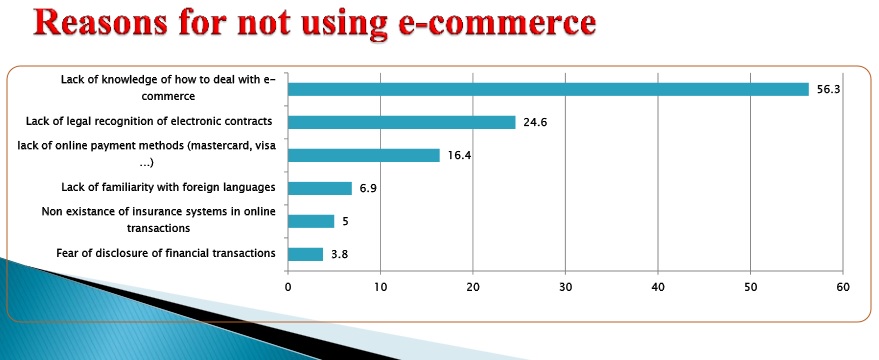E-commerce challenges and opportunities in Egypt
Egypt is poised to become a nation of e-commerce. A new mobile money portal allows Etisalat Egypt clients to execute money transfer and payment transactions through safe and secured channels. The advancement lays the groundwork for a new phase in financial services in Egypt.
Currently, however, e-commerce activities are scarce in the country. In 2012, only 2% of households that used the Internet engaged in e-commerce. Even most businesses still do not use e-commerce. Internet access is certainly limiting many from shopping online, for example, but the level of e-commerce awareness for those who do is low.
MCIT appears to understand the concepts of how to boost e-commerce, but the implementation of these action lines will be difficult given the stagnant macro-Egyptian economy. Egypt’s Ministry of Communication and Information Technology (MCIT) held a workshop on June 17-18 to address the importance of e-commerce. From the document we find a treasure trove of current information about Egypt’s e-commerce industry.
Key facts about Egypt’s Internet landscape:
- 44% of the population is reached by the Internet
- government is subsidizing Internet-related technology, is focused on providing Internet training to the general population & businesses, and is stressing the introduction of Arabic-language content
- More than 45% of Internet users are between 16-25 years of age; 36% of them spend more than 8 hours per day online
- The number of Facebook users has almost tripled since the time before the revolution (14 million accounts as of April 2013)
- Smartphones are used by 26% of those over the age of 16
- More than 90% of the population is covered by 3G service
How Internet contributes to Egypt’s GDP:
The Egyptian government is quick to point out how “the Internet’s impact on the Egyptian economy and society is not fully captured by e-GDP numbers”. Boston Consulting Group finds that onsumption, private investment, government spending, and net exports are easily seen in Egyptian GDP, but three other key areas are not:
- Facilitation of economic activity (online ads, B2B e-commerce)
- Increases in productivity and exports (efficiency in the manufacturing sector)
- Improvements in social services and connectivity (better access to information, e-health services, social networking)
Still, only 1.1% of Egypt’s GDP in 2011 is directly attributed to the Internet economy – about the same level as health services, education, and oil refining. Most of the e-GDP figure was investment by private companeis and spending by the Egyptian government. By 2017 that share is expected to grow by 50% to 1.6% with e-inclusion, business engagement, and e-commerce as key drivers.
Few households and businesses use e-commerce:
In 2012, very few households were directly involved in e-commerce. Only 2% of households using the internet (therefore around 1% of the total population) dealt with e-commerce. This doesn’t mean more Egyptians didn’t explore e-commerce sites, but it means that this many actually purchased items online. Interestingly, MCIT finds that 55% of e-commerce users purchase financial investments. 29% purchase movies, music, or photos. 15% purchase e-tickets and reservations. Only 8.5% purchase clothes online. Interestingly, households with children under 15 years in age are twice as likely as households with older children or young adults to purchase digital content online.
Nearly half of e-commerce users find the ability to return products or to get a refund troublesome. More than half of Egyptians not using e-commerce simply lack the knowledge to do so. One-sixth cite the lack of online payment methods a limiting factor.
Businesses are more likely to utilize e-commerce, but even then only 20-40% of them do so. Reasons for not partaking in e-commerce include the lack of the need for e-commerce activities and a preference for face-to-face transactions.
The next few years will see efforts by MCIT to strengthen:
E-inclusion
- expand PC literacy programs
- provide high quality infrastructure to expand the reach of the Internet
- increase the availability of Arabic content online
- improve mobile payment systems
- focus on e-signature laws
- roll-out a smart ID and salary card program for government employees
- create an e-commerce committee
Business engagement
- raise SME awareness
- create capacity building programs
- subsidize businesses involve with online exports
- adopt new approaches to enable public-private partnerships
- make it easier for businesses to launch and register their websites
Source: “Workshop on E-Commerce Council for Trade in Services,” Dr. Nagwa El Shennawy, Information Center Director, MCIT, Jun 17-18, 2013. http://www.wto.org/english/tratop_e/serv_e/wkshop_june13_e/el_shennawy_e.pdf.













 Twitter
Twitter Facebook
Facebook Pinterest
Pinterest